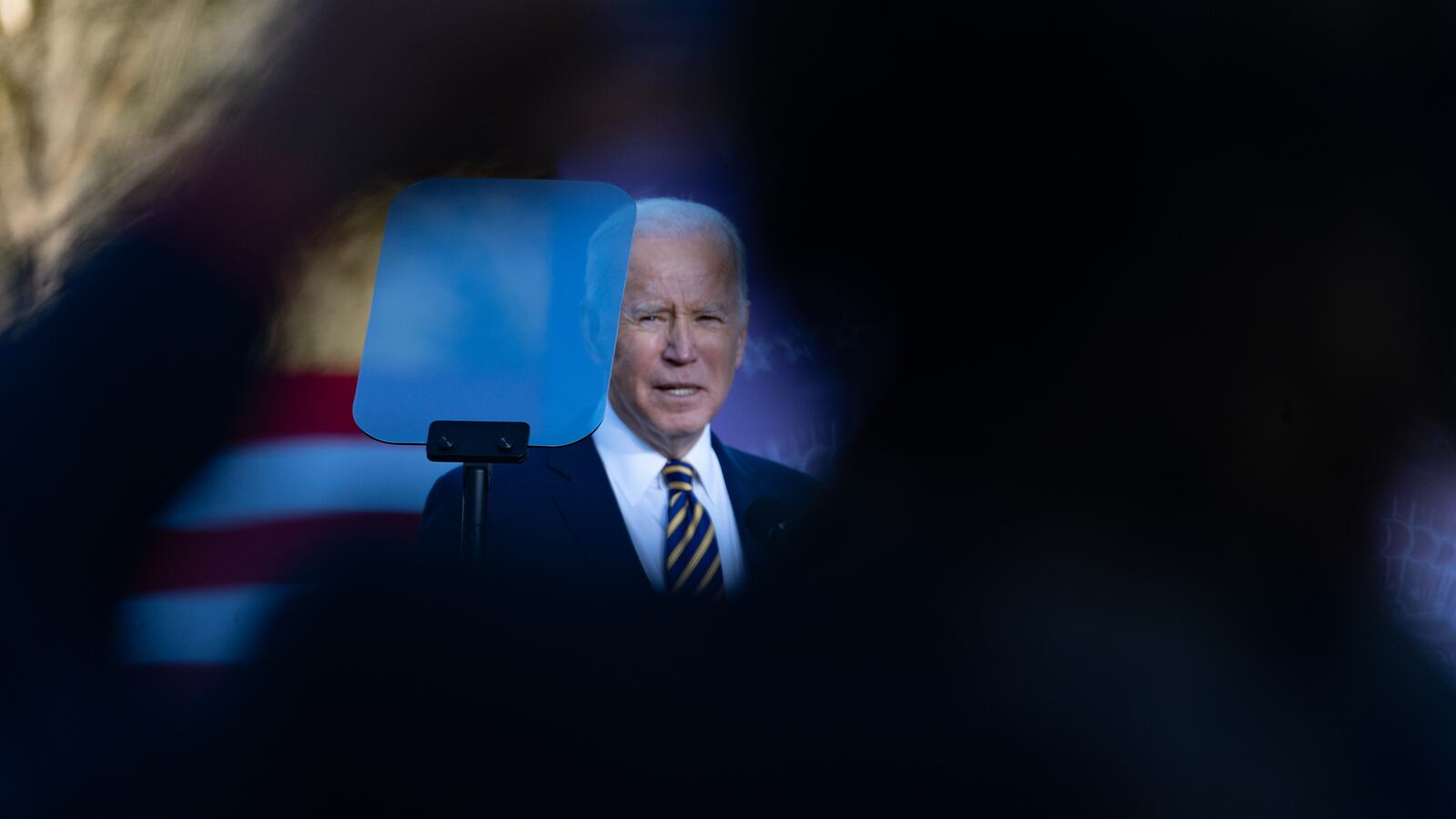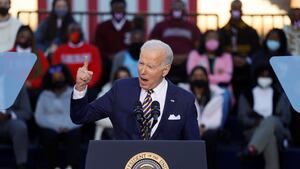Is it too little too late?
That is the question that hung in the air following the stirring, clearly heartfelt remarks from President Joe Biden and Vice President Kamala Harris on voting rights in Georgia on Tuesday afternoon.
It is the question that members of Biden’s base were posing by their boycott of the Georgia event. It is a question that resonated through social media as progressives expressed their dismay that critical legislation designed to restore and protect voting rights was now likely to fail despite the president’s commitment to fight for what he called “democracy’s threshold liberty.”
And it is almost certainly the wrong question.
Voting rights in the U.S. have been under assault for years. The Roberts Supreme Court has even ruled that they no longer need protecting as they once did in its notoriously wrong-headed Shelby County v. Holder decision. That court gave those with money a greater role in our democracy than those without it in their notoriously wrong-headed Citizens United decision. State legislatures, aided by the high court, have used gerrymandering to make fair elections less common.
The last U.S. president actively tried to steal an election and members of his party have proposed over 400 laws to make it harder for people more likely to vote for Democrats to vote at all. As Biden and Harris both noted, some of Georgia’s new voting laws are particularly egregious—making voting by mail and voting at drop boxes more difficult and making it a crime to bring food or water to people waiting in line to vote.
Biden noted that in 2006, 93 members of the U.S. Senate voted for the extension of the Voting Rights Act and President George W. Bush signed it into law. Bush like his father and Reagan and Ford and Nixon supported the legislation, as did virtually all Republicans for years. But since 2006, as the effects of right wing donors to win statehouses and pack the courts began to bear fruit, things changed for the worse. Citizens United was decided in 2010. Shelby County was decided in 2013.
Today, as Biden pointedly noted, not a single Republican is even willing to vote to allow debate to proceed on preserving the singular right on which our entire system of government is based.
But it is not, of course, just the Republicans. It would be possible to pass voting rights legislation if Democrats, who currently hold the majority in the Senate, would vote together to create the kind of filibuster reform that would allow protection of this key right to pass by a simple majority vote. It is not such a far-fetched idea. That is, after all, the way such measures passed the House of Representatives. And it is the way the Constitution provided for such measures to pass the Senate.
But some Democrats have vocally opposed filibuster reform of any sort. They have hid behind the outright lie that the filibuster is a great Senate tradition(it’s not—it’s regular use is a recent development and it’s mentioned nowhere in the Constitution) and unfounded spin (arguing that the filibuster promotes bipartisanship when in fact, it does not, often being used to impose the will of the minority on the majority). Perhaps some believed in these things at first, until they had been debunked a thousand times. Perhaps others saw the filibuster as a way to protect Democrats against a possible Republican majority, knowing full well the scorched earth tactics of Mitch McConnell and the modern GOP. But nothing stops the GOP from changing the rules to suit them should they regain the majority and so that argument too is empty.
Further, a narrow “carve out” on the filibuster pertaining to preserving voting rights would be in keeping with other recent carve outs, such as those around judicial nominations and budget reconciliation. So, why not support such a carve out?
There is only one possible answer: They or those to whom they are beholden are perfectly comfortable with the idea of, as Biden characterized it, “turning the will of the voters into a mere suggestion.” They, like the GOP, fear the will of the people in a country undergoing rapid demographic change. Whether that stems from racism or cynical preservation of political or economic self-interest, the result is the same.
Biden correctly and unflinchingly described these people as being on the side of George Wallace, Bull Connor and the racist thug faction in American history. But here’s the problem: They—Republicans and a select few Democrats--were like this before Biden and Harris arrived. And Biden and Harris and their team in the White House knew that it was extremely unlikely that they would ever change their positions.
Further, they knew that if they prioritized voting rights reform and they lost, that civil rights and voting rights activists, a vitally important part of the Democratic base, would be furious and that the rifts it caused in the party could deeply damage it… and thus their chances to maintain the Congressional majorities that are actually critical to preserving democracy, confirming better judges and passing meaningful legislation in the future.
The problem is that rift in the Democratic Party would occur whenever this issue finally arose and that is precisely what is happening now. And worse is very likely in store.
Joe Biden now says that he supports filibuster reform, but Joe Manchin and Kyrsten Sinema are very unlikely to do so and they have votes in the Senate and he does not–a point he made when referring to the “51 presidents” he had to deal with in the upper house of Congress. (See the sad fate of the Build Back Better package for evidence of this.)
If even one Democrat holds out that no meaningful voting rights legislation will pass. And the president will, because he is president, get blamed for it—even though the fault lies squarely on the GOP and the obstructionist Democrats who are, for all intents and purposes, caucusing with them on this. And that will produce acrimony and divisions in the Democratic Party. And it may lead some people not to vote or work as hard for Democrats in November. And should the Democrats lose the House and perhaps also the Senate in November, the erosion of democracy in America will only accelerate.
While that sounds like a worst-case scenario, it is actually, right now, a most likely case scenario. It will take real leadership not just from the president but also from voting rights, civil rights and other leaders within the Democratic Party to ensure that perfectly reasonable frustrations and understandable anger with the situation do not become an accelerant that makes the situation even worse.
If voting rights legislation does not pass, the path to protecting democracy becomes much more difficult but above all else it depends on one thing: cohesion within the Democratic Party. Expressing criticism and debating strategies is inevitable and healthy. Blaming Biden for a crisis that began long before he took office and that he and Harris have actively combatted at every stage of their careers is unfair. So too is blaming them for the actions of the GOP or for their inability to transform the opponents of democracy into patriots overnight.
We're entering circular firing squad territory with the attacks on the president and the White House for supposedly doing “too little, too late.” Voting rights advocates targeting Biden are doing the work of the GOP and the opponents of voting rights. Whatever our differences, only party unity gives us a chance to defeat them.
If what is being done to preserve democracy now is “too little too late,” it is too little in the face of a massive, well-funded right-wing campaign to rob Americans of our most fundamental right and it is too late because that campaign has been going on for years and years. The measures currently being proposed, the Freedom to Vote Act and the John Lewis Voting Rights Advancement Act, are vitally important. The president and vice president have put themselves squarely behind them, even though the likelihood they will fail are high. That is an act of courage for which they deserve credit.
But even if you do not see it that way, we should try to zero in not on who is to blame but on what we can do. Passion and idealism can be important allies, but they become enemies when they direct us away from what actually can be achieved.








